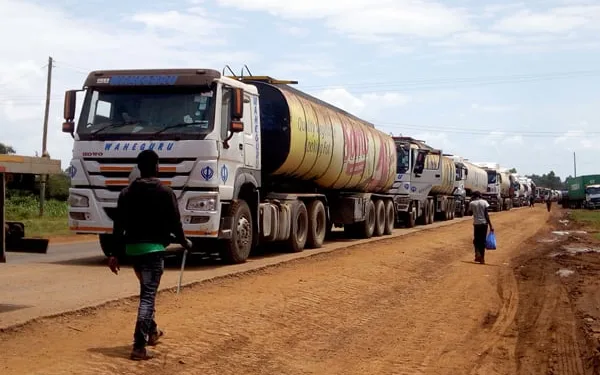Kenya has agreed to finally license the Uganda National Oil Company (UNOC), after spending numerous months over a major feud that spilled over to the regional court and hurt diplomatic ties between the two East African nations.
This is coming after Uganda went to the regional court in December 2023 to fight over the license that would allow the use of Kenya Pipeline Company’s (KPC) infrastructure.
The agreement deal was announced by Kenya’s Energy Cabinet Secretary, Davis Chirchir where he mentioned that work is currently in progress to issue a permit that will allow Uganda to import fuel directly through Kenya Pipeline Company (KPC).
The imported petroleum products will be transported through Kenya’s port of Mombasa. Mr Chirchir said,
“They will employ Kenya Pipeline Company’s infrastructure so there will be no loss of opportunity, the transporter will remain top be KPC. We are working closely with Uganda to resolve the challenge.”
The announcement regarding the licensing of UNOC came shortly after a case filed at the High Court in Machakos, which aimed to block the licensing process, was withdrawn.
According to sources familiar with the matter, it is anticipated that the license will be issued in the upcoming month.
This development in the licensing process has the potential to resolve the ongoing dispute and pave the way for UNOC to engage in fuel purchases from Vitol Bahrain (an energy commodity company).
The Kenyan energy regulator explained it declined only because UNOC failed to comply with the law.
Also Read: Ugandan President Museveni Makes Son Army Chief
What Will This License Mean To The Economy Of Uganda?
Uganda National Oil Company’s decision to initiate direct fuel imports from Vitol Bahrain is expected to have a significant impact on the revenues of local oil marketing companies that have long been key suppliers of fuel in Uganda.
For decades, these companies have played a crucial role in supplying fuel across the country. UNOC, traditionally focused on supplying fuel to State-owned entities in Uganda, is now poised to enter the market of selling to private oil marketers, signalling a notable shift in the dynamics of the fuel supply chain within the country.
This move by UNOC is likely to introduce increased competition and reshape the landscape of the fuel industry in Uganda.
Also, this deal will improve the oil market in Uganda and by extension the economy.
Uganda initiated discussions for direct fuel imports through UNOC several months after Kenya unveiled an agreement with Gulf majors.
The purpose of this arrangement was to facilitate fuel imports on a one-hundred-and-eighty-day credit period. This strategic move aimed to alleviate dollar demand pressures and provide support for the stability of the local currency, the shilling.
In April of the previous year, Kenya initiated a government-backed agreement with major players like Saudi Aramco, Abu Dhabi National Oil Corporation, and Emirates National Oil Company.
Originally set to expire at the end of the previous year, this agreement was subsequently extended until December 2024.
Uganda, which annually imports an average of 2.5 billion litres of petroleum valued at $2 billion (approximately Sh261.98 billion), primarily relies on KPC and local oil firms for handling at least 90% of this cargo.
Despite concerns that UNOC’s direct entry into Kenya as an importer may adversely affect local oil companies, it’s noteworthy that KPC won’t experience any revenue losses.
This is because the Ugandan entity plans to continue utilizing KPC’s storage facilities and transport network for shipping fuel to its neighbouring country.
UNOC had initially aimed to commence direct importation in January but had to postpone the rollout indefinitely due to its inability to secure a license from EPRA (Energy and Petroleum Regulatory Authority).
Kenya’s energy sector regulator declined the request due to the non-compliance with legal requirements. Energy and Petroleum Regulatory Authority specifically mentioned UNOC’s failure to demonstrate ownership of a licensed petroleum depot and a minimum of five retail stations in Kenya.










